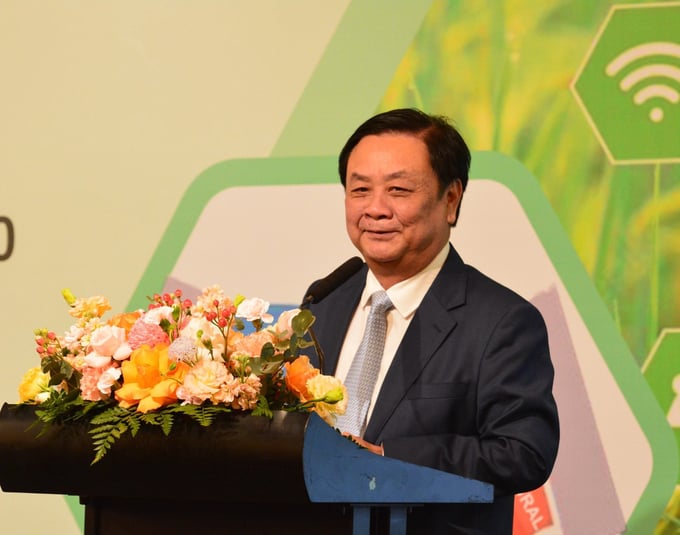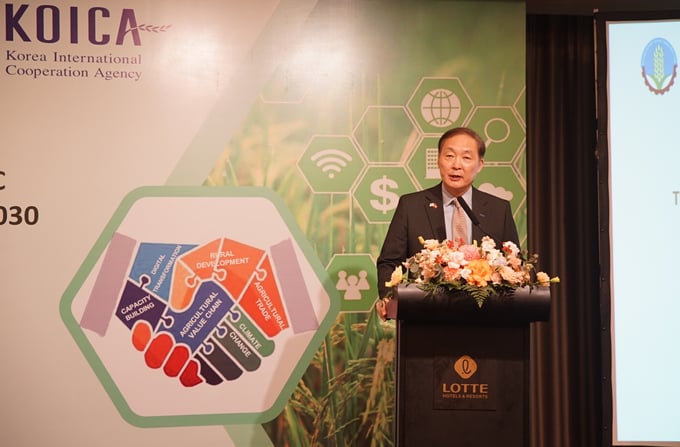May 29, 2025 | 10:58 GMT +7
May 29, 2025 | 10:58 GMT +7
Hotline: 0913.378.918
May 29, 2025 | 10:58 GMT +7
Hotline: 0913.378.918
Mr. Nguyen Anh Phong, Deputy Director of the Institute of Policy and Strategy for Agriculture and Rural Development (IPSARD), assessed the current state of cooperation between the two sides, stating that cooperation between Vietnam and South Korea in agriculture and rural development has produced impressive results in recent years.

Minister Le Minh Hoan evaluated that the "Vision for Vietnam - South Korea Cooperation in Agriculture and Rural Development for the period 2024 - 2030" is an extremely practical report.
South Korea is a major export market for Vietnamese agricultural products. Between 2010 and 2023, the export value of Vietnamese agricultural, forestry, and aquatic goods to South Korea quadrupled. In 2022, South Korea imported USD 51.57 billion in agricultural, forestry, and aquatic products, with Vietnam ranking fifth, contributing for almost 5% of the overall import value.
Vietnam-South Korea agricultural cooperation is primarily focused on technology transfer for the development of biofuel crops, high-quality vegetable varieties, edible and medicinal mushroom production technology, safe food production, temperate fruit tree development, agricultural promotion, and the application of Industry 4.0 in agriculture; and promoting the trade of competitive agricultural products from both countries.
Mr. Phong did, however, point out that agricultural commerce between Vietnam and South Korea continues to be limited. Vietnamese agricultural, forestry, and aquatic product exports to South Korea remain very small, with most being raw or semi-processed, resulting in poor value.
Furthermore, South Korea has strict food safety and technical standards, whereas importers' technical competence remains restricted. In contrast, South Korean agricultural goods encounter some challenges when sold to Vietnam. Low- and middle-income households in Vietnam find it difficult to get high-value Korean agricultural goods.
Ms. Lee Hye Jin of Konkuk University (South Korea) remarked that developing a vision for Vietnam-South Korea agricultural cooperation is critical, especially because both sides still have plenty of area to explore. The policy and economic environment in Vietnam and throughout the world are changing, necessitating the development of a new cooperative approach.
According to Ms. Lee, important areas for Vietnam-South Korea agricultural cooperation include agricultural value chains, rural development, climate change adaptation and green transformation in agriculture, agricultural commerce, and capacity building for farmers and value chain partners.
Minister Le Minh Hoan suggested that the "Vision for Vietnam - South Korea Cooperation in Agriculture and Rural Development for the period 2024 - 2030" should focus on leveraging both sides' potential and diversifying cooperation from technical assistance to new forms of investment to ensure agriculture sector sustainability. This is a very essential and useful report.

Mr. Chang Won Sam, President of the Korea International Cooperation Agency (KOICA), stated that agriculture continues to be a focal cooperation area between the two sides.
This allows us to discover prospective areas of collaboration in order to optimize both nations' comparative advantages, diversify forms of cooperation and investment, and improve efficiency and sustainability. This activity is expected to bring about significant results, such as contributing to the sustainable growth of Vietnam's agriculture sector; boosting investment-trade cooperation between Vietnam and South Korea in agriculture and rural development towards sustainability and comprehensiveness; and improving the cooperation structure between the public sector (central and local governments) and the private sector (domestic and FDI from South Korea)," Minister Le Minh Hoa
On the South Korean side, Mr. Chang Won Sam, President of the Korea International collaboration Agency (KOICA), emphasized that agriculture remains a key area of collaboration between the two countries, with support from a shared long-term policy.
Specifically, in agriculture, while the share of foreign direct investment (FDI) remains low, the magnitude of official development aid (ODA) is growing. However, Vietnam is predicted to enter the list of middle-income nations by 2030, necessitating a reduction in the size of ODA programs. To increase the long-term appeal of foreign investment projects in agriculture, it is vital to research and offer ways for making better use of ODA funding.
Mr. Chang noted that KOICA would continue to help Vietnam's agricultural growth through a variety of initiatives such as value chain improvement, market linkages strengthening, climate change adaptation capacity enhancement, digitalization, innovation, and improvement. As a result, Vietnamese farmers' incomes will rise, and Vietnam's agriculture will continue to grow sustainably.
Translated by Dieu Linh

(VAN) Ms. Nguyen Thi Dung, Deputy Director of Ngoc Hoang Cooperative, shared about the journey of bringing dragon fruit to Europe, achieving annual revenues in the billions of VND.

(VAN) Bamboo products from Thang Tho Bamboo Cooperative have reached many countries around the world, while also creating jobs for local workers.

(VAN) The Management Board of Con Dao National Park reported that a green sea turtle, tagged in the Philippines, has traveled thousands of kilometers to lay 84 eggs on Bay Canh Islet.

(VAN) Green technology is paving a new path for sustainable aquaculture in the Mekong Delta in particular and across the country in general, helping reduce emissions and adapt to climate change.

(VAN) On May 27, La French Tech Vietnam (the French startup and innovation community in Vietnam) held the French Tech Summit Vietnam 2025.
/2025/05/27/4731-2-223159_980.jpg)
(VAN) No votive paper, no styrofoam, no plastic bags, no plastic bottles, and no single-use plastic trays are the key rules tourists should keep in mind when visiting Con Dao.

(VAN) In the fight against plastic pollution, Vietnam has been demonstrating a proactive, pioneering, and active role in addressing the greatest environmental challenge today.